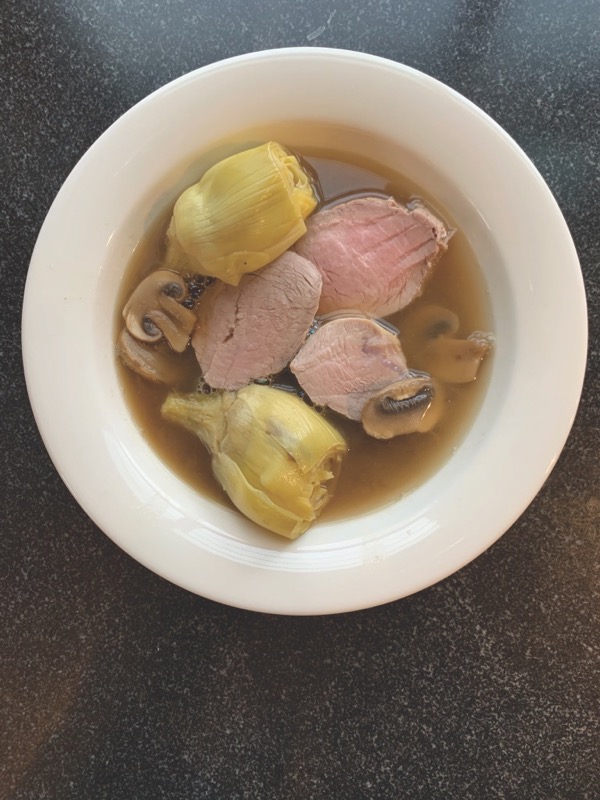When I was in college in the 1990s, there was a restaurant in Harvard Square called Iruña — which is the Basque name for the city of Pamplona. A friend’s mother took me there once for lunch and I ordered a dish called Pork Tenderloin Estofado: thick slices of juicy tenderloin in a delicate broth with artichokes and mushrooms. I found it so transcendent I had to go back and order it again and again.

Being a regular at Iruña meant a certain waiter never carded me. Sometimes I would bring a friend along, just to share the thrill of sitting with a pitcher of red sangria in the restaurant’s garden.
In 2010, my now-husband and I bought a house in Cambridge. It never crossed my mind that I’d end up living in my college town as an adult. Once I got over the feeling of being Methuselah among the students everywhere, I began re-exploring what remained of my college haunts. A few places, like The Garage and Shay’s and Charlie’s Kitchen, lived on. Tragically, Iruña had disappeared.
I found out the woman who had owned it for nearly 50 years — Josefina Yanguas — had died a few years before. While her other establishment, Café Pamplona, was still brewing up philosophical debates in the basement of what had been her house at 12 Bow St. in Harvard Square, Iruña was now a branch of a Venezuelan restaurant.
Determined to recreate my favorite dish at home, I came across an August 2007 article about Yanguas in the Boston Globe. After her death, her niece had remarked, “The maddening part about my aunt was that she never followed anything by a recipe.” Finding the secret to her Pork Tenderloin Estofado was going to be a challenge. But living in Cambridge means access to some of the world’s finest libraries. One of them, the Schlesinger Library at Radcliffe (the Arthur and Elizabeth Schlesinger Library on the History of Women in America, to be exact), holds a famous collection of cookbooks, including the entirety of Julia Child’s personal library.
Given that Yanguas had lived in Cambridge for 50 years, I figured there was a chance the Schlesinger would have something of hers. I grabbed a notebook and a pencil, biked over to Radcliffe Yard, and applied for a researcher’s library pass. A half hour later, a librarian appeared with a collection of Yanguas’s recipes in the form of a plastic-comb-bound volume from 1966 titled The Cambridge Iruña Cookbook of Spanish and Basque Dishes.
I raced through the table of contents and the index, but Pork Tenderloin Estofado, to my dismay, did not appear. I read the cookbook anyway, taking notes on Yanguas’s usual ingredients and techniques — her flavor bases, her reduction times, the types of vegetables she chose, and especially her braising methods, since although estofado is Spanish for “stew,” the dish is actually more of a braise. After three attempts, I somehow managed to make the dish exactly as she once had. Josefina, your Estofado lives on.
Pork Tenderloin Estofado
Serves four
2 whole pork tenderloins
2 cans medium artichoke hearts*
8-10 large white mushrooms
1 small yellow onion
2 cloves garlic, peeled and minced
2 or 3 bay leaves
1 cup white wine
1 cup chicken stock
1 cup artichoke water
2 Tbsp. olive oil
Kosher salt and black pepper
1/4 tsp. Espelette pepper (optional)
1 Tbsp. sliced flatleaf parsley (optional)
Warm a tablespoon of the olive oil in a Dutch oven or similar heavy-lidded pan, spreading it out to coat the bottom of the pan.
Rinse and pat the tenderloins dry, then season generously with salt, and sear them evenly on all sides, about 3-4 minutes per side. The pork may stick to the pan a little, but then release as it sears.
While the pork cooks, peel and dice the onion, mince the garlic, slice the mushrooms, and strain the artichokes, retaining the water from the cans.
Remove the pork tenderloins to a dish with a lip to gather the meat’s juices while it rests.
Add another tablespoon of olive oil to the Dutch oven, along with the aromatics (onion, garlic, bay leaf) and a pinch of salt. Cook them gently for 3-4 minutes, scraping the bottom of the pan while the aromatics soften to deglaze it.
Next, add the chicken stock, the artichoke water, and the white wine; bring to a boil, then lower the heat to a simmer and reduce for 5 minutes.
Put the pork back into the pan, along with any juices gathered on the plate. Cover and simmer gently for 15 minutes. Halfway through, turn the pork over.
Remove the pork once again to its plate to rest. Pour the broth from the pan through a strainer into a bowl, then return the now-strained broth to the pan. (Discard what’s left in the strainer.)
Now add the sliced mushrooms to the pan and bring them to a gentle boil, letting them give up their own water for a minute. Then add the artichokes and simmer gently for 3-4 more minutes. Taste the broth: it should taste bright and delicate. Add a few tablespoons of cold water if it’s too acidic or a small squeeze of lemon juice if it needs a lift. (This will largely depend upon the brand of artichokes you used.) Adjust the salt and pepper and add the Espelette pepper now if you’re using it.
Slice the pork into 3/4-inch thick pieces and serve it in low bowls with some of the artichokes, mushrooms, and plenty of the broth. Sprinkle with sliced parsley as a garnish.
* Be sure to use canned artichokes, not marinated. You will be using some water from the artichokes for the broth. I prefer Laurel Hill brand because it is less acidic than other brands.
Jeremy Faro goes back and forth between Cambridge and Provincetown.



